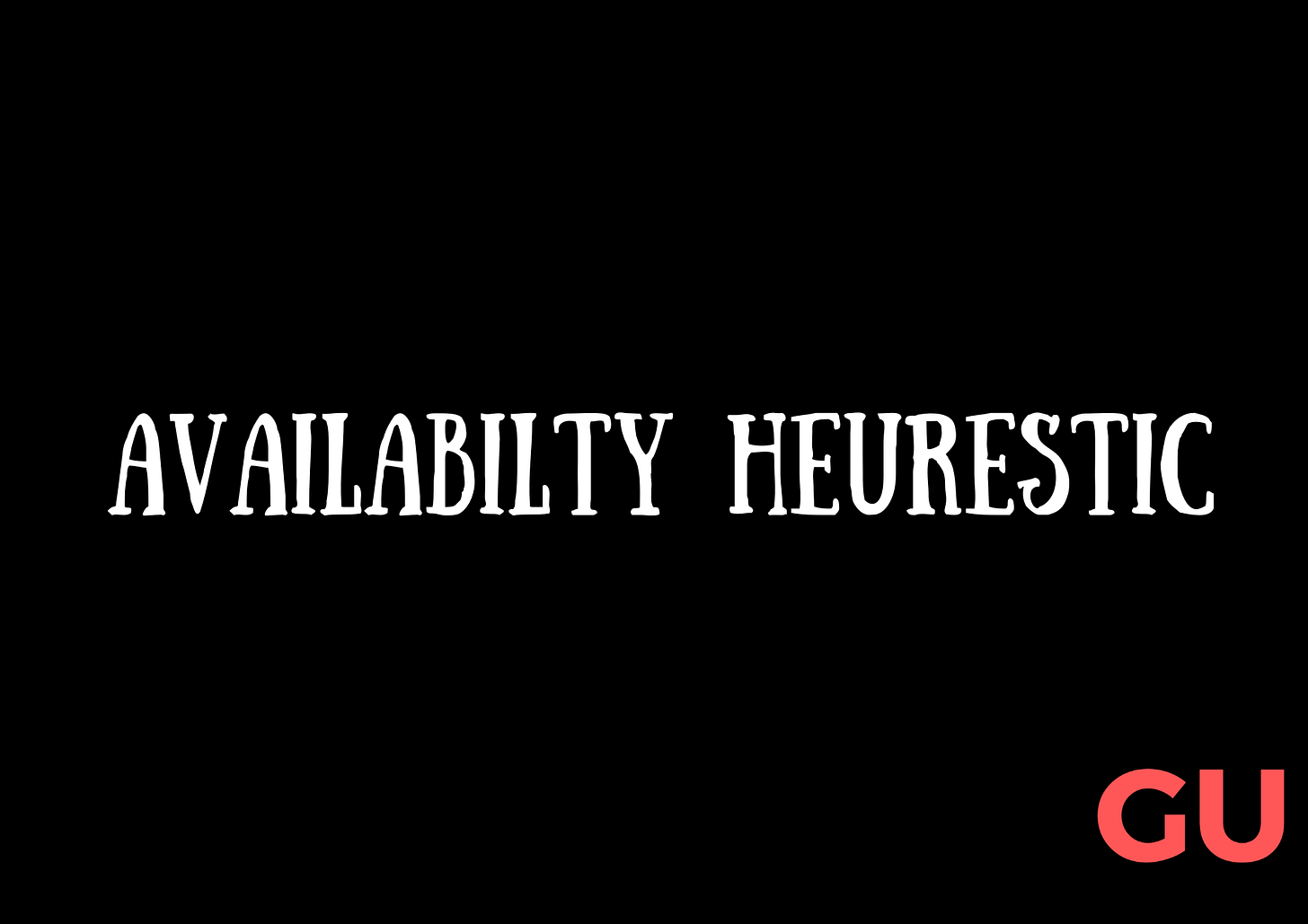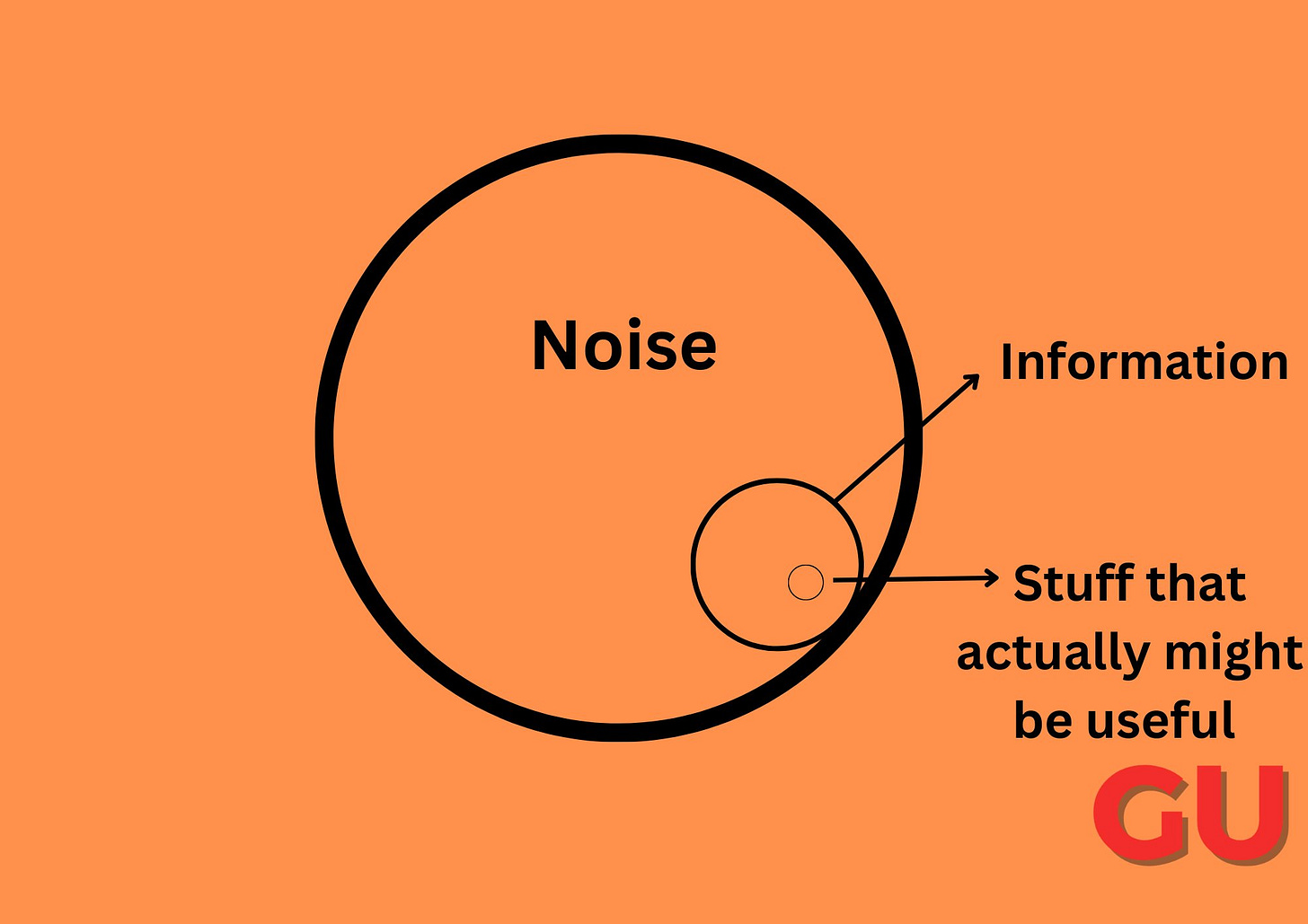Saturday Serendipity
Quote, Mental Model, Interesting food.
Hi.
Reading time: About minutes
Quote
“The older I get the more I realize how many kinds of smart there are. There are a lot of kinds of smart. There are a lot of kinds of stupid, too.”
— Jeff Bezos
Mental Model
Availability heurestic
Let’s play a game
Guess how many things are black around you right now without looking around?
Got an answer?
Now tell me how many things are black after looking around?
If you are like me and most other people you would have said something like a TV or pen something which comes to your mind easily in the start and then the second time when you could look around you selectively looked for things which are black and found a lot of things which are black.
Availabilty bias was first studied by Tversky and Kahneman in 1973. ‘We tend to judge the likelihood and significance of things based on how easily they come to mind.’
The more ‘available’ a piece of information is to us the more we believe it to be true. What we look at we believe to be is real. When it comes to people who smoke we only look at the survivors (survivorship bias) because that is what confirms our belief.
We also tend to weigh information which is more vivid instead of the same information being formatted in a ‘boring way’.
Most people would see this video and remember it. Because the visual is distressing. We also overweigh information which is recent. This is also known as recency bias.
An event that evokes emotions and is vivid, easily imagined, and specific will be more available than an event that is unemotional in nature, bland, difficult to imagine, or vague. - Daniel Kahneman
But because of these tendencies of overweighing information in some forms we should avoid things such as news and media because most of it is just noise.
“Personal experience can also make information more salient. If you’ve recently been in a car accident, you may well view car accidents as more common in general than you did before. The base rates haven’t changed; you just have an unpleasant, vivid memory coming to mind whenever you get in a car. We too easily assume that our recollections are representative and true and discount events that are outside of our immediate memory. To give another example, you may be more likely to buy insurance against a natural disaster if you’ve just been impacted by one than you are before it happens.” - Farnam Street
“People tend to assess the relative importance of issues by the ease with which they are retrieved from memory—and this is largely determined by the extent of coverage in the media.” —Daniel Kahneman, Thinking Fast and Slow
There is one idea that resonates with me when I think of this bias. Morgan Housel had written in his book that everyone looks at money in their own way through their own experiences. Some people have a lot of money and don’t value it as much as others. Some treat it like it is everything. Both type of people cannot think like the other due to the fact that they are like this because of all the information that they have witness first hand. This is what is ‘available’ to them.
“We overestimate the likelihood of unlikely events. And we underestimate the likelihood of likely events.” - Farnam Street
In Investing
This is the perfect time to write about biases because they are so evident in the current market. I have been looking at Instagram and I saw a lot of ads which captivated me. There was an ad of someone who recommends stocks and sells courses. The ad went ‘ We told you to buy Starbucks share at 10rs it is now 20rs. Buy my course’ .
During this time of euphoria people who don’t know a dime about markets also see people like this and fall prey. This ad was a bit too bad because the company they mentioned is not even listed in India. It is a part of the Tata Consumer business.
There is a story of someone who is a ‘stock guru’ who predicts what a stock will do the next day.
He has a large following of approximately 300,000 people. He informs one third of his followers that the price of Reliance will decrease by 5% or more. He tells another third that the price will fluctuate within the range of -5 to +5%. To the final third, he suggests that the price will increase by 5% or more.
Of course he was right for one group of people.
This continued where he predicted the same way to three different groups based on the total following being right along the way for some people. In the end there were 500 people who believed he was a guru who knew everything as he was right 5 times in a row for them.
The 500 people fell prey to the ‘availability bias’.
We overweigh recent information in the markets. We tend to overweigh the short term news at the expense of long term fundamentals.
Antidote
Getting over biases is not easy. It is really hard. Professor Bakshi who has been teaching these biases for a long time, has a saying which I love, “Not a year goes by where I don’t fall prey to the biases, I teach.”
Although we can try. So these are the antidotes provided by Farnam Street:
#1. Always consider base rates when making judgments about probability.
The base rate of something is the average prevalence of it within a particular population. For example, around 10% of the population are left-handed. If you had to guess the likelihood of a random person being left-handed, you would be correct to say 1 in 10 in the absence of other relevant information. When judging the probability of something, look at the base rate whenever possible.#2. Focus on trends and patterns.
The mental model of regression to the mean teaches us that extreme events tend to be followed by more moderate ones. Outlier events are often the result of luck and randomness. They’re not necessarily instructive. Whenever possible, base your judgments on trends and patterns—the longer term, the better. Track record is everything, even if outlier events are more memorable.#3. Take the time to think before making a judgment.
The whole point of heuristics is that they save the time and effort needed to parse a ton of information and make a judgment. But, as we always say, you can’t make a good decision without taking time to think. There’s no shortcut for that. If you’re making an important decision, the only way to get around the availability heuristic is to stop and go through the relevant information, rather than assuming whatever comes to mind first is correct.#4. Keep track of information you might need to use in a judgment far off in the future.
Don’t rely on memory. In Judgment in Managerial Decision-Making, Max Bazerman and Don Moore present the example of workplace annual performance appraisals. Managers tend to base their evaluations more on the prior three months than the nine months before that. It’s much easier than remembering what happened over the course of an entire year. Managers also tend to give substantial weight to unusual one-off behavior, such as a serious mistake or notable success, without considering the overall trend. In this case, noting down observations on someone’s performance throughout the entire year would lead to a more accurate appraisal.#5. Go back and revisit old information.
Even if you think you can recall everything important, it’s a good idea to go back and refresh your memory of relevant information before making a decision.
Interesting find
Enjoy your weekend!
Thank you,
Samvit.




